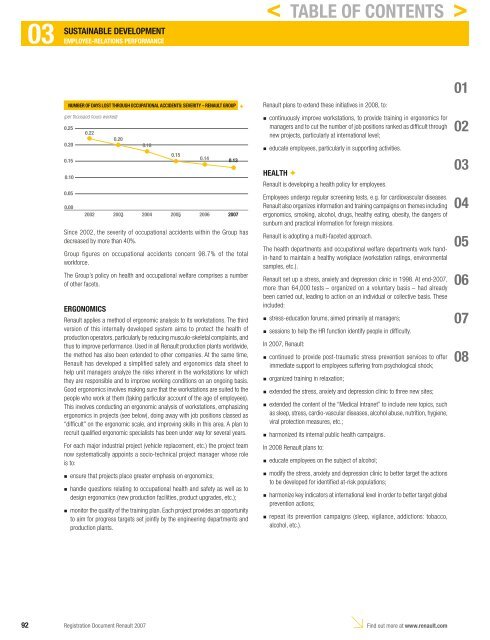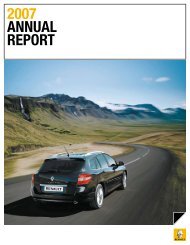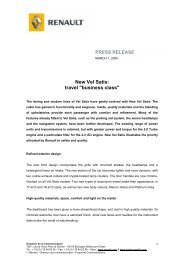2007 Interactive Registration Document - Renault
2007 Interactive Registration Document - Renault
2007 Interactive Registration Document - Renault
Create successful ePaper yourself
Turn your PDF publications into a flip-book with our unique Google optimized e-Paper software.
03 EMPLOYEE-RELATIONS<br />
SUSTAINABLE DEVELOPMENT<br />
PERFORMANCE<br />
NUMBER OF DAYS LOST THROUGH OCCUPATIONAL ACCIDENTS: SEVERITY – RENAULT GROUP ✦<br />
0.25<br />
0.20<br />
0.15<br />
0.10<br />
0.05<br />
0.00<br />
Since 2002, the severity of occupational accidents within the Group has<br />
decreased by more than 40%.<br />
Group figures on occupational accidents concern 98.7% of the total<br />
workforce.<br />
The Group’s policy on health and occupational welfare comprises a number<br />
of other facets.<br />
ERGONOMICS<br />
<strong>Renault</strong> applies a method of ergonomic analysis to its workstations. The third<br />
version of this internally developed system aims to protect the health of<br />
production operators, particularly by reducing musculo-skeletal complaints, and<br />
thus to improve performance. Used in all <strong>Renault</strong> production plants worldwide,<br />
the method has also been extended to other companies. At the same time,<br />
<strong>Renault</strong> has developed a simplifi ed safety and ergonomics data sheet to<br />
help unit managers analyze the risks inherent in the workstations for which<br />
they are responsible and to improve working conditions on an ongoing basis.<br />
Good ergonomics involves making sure that the workstations are suited to the<br />
people who work at them (taking particular account of the age of employees).<br />
This involves conducting an ergonomic analysis of workstations, emphasizing<br />
ergonomics in projects (see below), doing away with job positions classed as<br />
“diffi cult” on the ergonomic scale, and improving skills in this area. A plan to<br />
recruit qualifi ed ergonomic specialists has been under way for several years.<br />
For each major industrial project (vehicle replacement, etc.) the project team<br />
now systematically appoints a socio-technical project manager whose role<br />
is to:<br />
n<br />
n<br />
n<br />
ensure that projects place greater emphasis on ergonomics;<br />
handle questions relating to occupational health and safety as well as to<br />
design ergonomics (new production facilities, product upgrades, etc.);<br />
monitor the quality of the training plan. Each project provides an opportunity<br />
to aim for progress targets set jointly by the engineering departments and<br />
production plants.<br />
<strong>Renault</strong> plans to extend these initiatives in 2008, to:<br />
continuously improve workstations, to provide training in ergonomics for<br />
managers and to cut the number of job positions ranked as diffi cult through<br />
new projects, particularly at international level;<br />
educate employees, particularly in supporting activities.<br />
HEALTH ✦<br />
<strong>Renault</strong> is developing a health policy for employees.<br />
Employees undergo regular screening tests, e.g. for cardiovascular diseases.<br />
<strong>Renault</strong> also organizes information and training campaigns on themes including<br />
ergonomics, smoking, alcohol, drugs, healthy eating, obesity, the dangers of<br />
sunburn and practical information for foreign missions.<br />
<strong>Renault</strong> is adopting a multi-faceted approach.<br />
The health departments and occupational welfare departments work handin-hand<br />
to maintain a healthy workplace (workstation ratings, environmental<br />
samples, etc.).<br />
<strong>Renault</strong> set up a stress, anxiety and depression clinic in 1998. At end-<strong>2007</strong>,<br />
more than 64,000 tests – organized on a voluntary basis – had already<br />
been carried out, leading to action on an individual or collective basis. These<br />
included:<br />
stress-education forums, aimed primarily at managers;<br />
sessions to help the HR function identify people in diffi culty.<br />
In <strong>2007</strong>, <strong>Renault</strong>:<br />
continued to provide post-traumatic stress prevention services to offer<br />
immediate support to employees suffering from psychological shock;<br />
organized training in relaxation;<br />
extended the stress, anxiety and depression clinic to three new sites;<br />
extended the content of the “Medical Intranet” to include new topics, such<br />
as sleep, stress, cardio-vascular diseases, alcohol abuse, nutrition, hygiene,<br />
viral protection measures, etc.;<br />
harmonized its internal public health campaigns.<br />
In 2008 <strong>Renault</strong> plans to:<br />
educate employees on the subject of alcohol;<br />
modify the stress, anxiety and depression clinic to better target the actions<br />
to be developed for identifi ed at-risk populations;<br />
harmonize key indicators at international level in order to better target global<br />
prevention actions;<br />
repeat its prevention campaigns (sleep, vigilance, addictions: tobacco,<br />
alcohol, etc.).<br />
92 <strong>Registration</strong> <strong>Document</strong> <strong>Renault</strong> <strong>2007</strong><br />
Find out more at www.renault.com<br />
n<br />
n<br />
n<br />
n<br />
n<br />
n<br />
n<br />
n<br />
n<br />
n<br />
n<br />
n<br />
n<br />
< TABLE OF CONTENTS ><br />
01<br />
02<br />
03<br />
04<br />
05<br />
06<br />
07<br />
08




